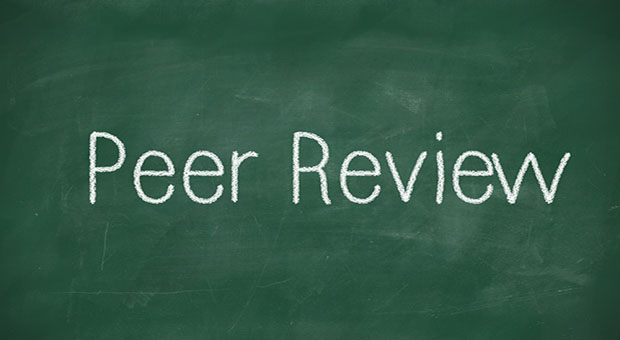The theme for this year’s Peer Review Week is ‘research integrity’ – that really strikes a chord with our new columnists…

As we mark peer review week – it’s good to take time to reflect on how pivotal the process is in maintaining the quality of research.
This year’s theme, Research Integrity: creating and supporting trust in research, is particularly important for Cancer Research UK. Last year we deepened our commitment to good research practice by becoming a signatory of the Concordat to Support Research Integrity. Not only that – along with UK Research and Innovation and GuildHE, we are part of a consortium of organisations considering if potential indicators of research integrity will be useful to ensure integrity across different labs and groups.
We take research integrity seriously… as we should. It is the cornerstone of good science. For the cancer research community this is important, not just because conducting research according to the highest standards is the ‘right’ thing to do, but because it is the most effective way to bring forward the day when all cancers are cured.
In-house expertise
And it’s been pleasing to see that some of our institutes have gone further still in their commitment to this by appointing dedicated research integrity advisers to not only uphold standards, but also facilitate training and guidance.
 100vw, 193px”></p>
<p class=) Dr Catherine Winchester is Senior Research Adviser at the CRUK Beatson Institute.
Dr Catherine Winchester is Senior Research Adviser at the CRUK Beatson Institute.
Dr Catherine Winchester, Senior Research Adviser at the CRUK Beatson Institute in Glasgow, explains: “I try to instil integrity principles throughout the whole research cycle. At the Beatson we help researchers really think about designing experiments, how they’re going to organise and curate data right through to pre-submission manuscript review.”
And it’s this checking of manuscripts that is an incredibly useful way to ensure research meets standards. Data is checked, graphs are pored over, and figures scrutinised, says Winchester. “I read manuscripts for clarity, and I’m very picky about people’s descriptions in figure legends. I really encourage people to go beyond basic data information and try to drill down into what those data are,” she says.
She is keen, however, to point out that despite the wide remit, there is one thing they definitely don’t do. “Our roles aren’t about policing,” she says. “It’s not about having a little black book and noting everything down – it’s about supporting and being advocates for good research practice.”
“The majority of scientists I meet and interact with are absolutely not falsifying their data, a lot of the issues arise from simple mistakes,” she points out. “And that’s what I’m trying to target by making sure people are trained properly.”
 100vw, 273px”></p>
<p class=) Dr Andrew Porter is Research Integrity and Training Adviser at the CRUK Manchester Institute. Keep an eye-out for Andrew and Catherine’s upcoming column with us on all things research integrity.
Dr Andrew Porter is Research Integrity and Training Adviser at the CRUK Manchester Institute. Keep an eye-out for Andrew and Catherine’s upcoming column with us on all things research integrity.
Dr Andrew Porter, Research Integrity and Training Adviser at the CRUK Manchester Institute – part of the University of Manchester – agrees. “I think people hear ‘research integrity’ and in their minds they go straight to research misconduct. So that’s the bad practices of research – fabrication, falsification, plagiarism… and there’s lots written in the research integrity field about why people do that, and how we can prevent it,” he says. “But actually, scientists often just need support to do what they want to do well. Most researchers want to operate in a way which is ethical and fits their own moral code and their own sense of who they want to be in science.”
Keeping up with integrity
There is an ever-growing awareness of the issues around research integrity in the cancer research community, and it is an area where thinking can advance at pace.
Indeed, it has rapidly developed into a field in its own right – complete with its own societies, journals and conferences. Study and debate on the ‘metascience’ of how we best conduct and report science means we all need to be open to changes in best practice. But when pressures on researchers in all other aspects of their careers is also high – these changes might not always be top-of-mind.
“Historically there has always been the feeling that science is self-correcting,” says Porter. “The idea that it’s all right if mistakes happen, because other people will find out if something was done in a way that wasn’t quite right, and the next person who tries to do it will correct for that. But I think that link is broken, because there isn’t enough time for people to repeat other people’s experiments.”
For that reason, we are really pleased to let you know that both Catherine and Andrew will be writing a regular column for us sharing their experiences from the front line of research integrity. Their expertise really will give us an incredible view of the latest processes and thinking around research integrity, and, importantly, how to go about implementing them to your own work.
Keep your eyes peeled on this blog, and our email and social channels over the coming months to catch the first instalments as we help you to be the best scientists you can be.
As a signatory to the Concordat to support research integrity, CRUK is committed to:
- Upholding the highest standards of rigour and integrity in all aspects of research; both the research itself and any resulting publications.
- Ensuring that research is conducted according to appropriate ethical, legal and professional frameworks, obligations and standards.
- Supporting a research environment that is underpinned by a culture of integrity and based on good governance, best practice and support for the development of researchers.
- Using transparent, timely, robust and fair processes to deal with allegations of research misconduct should they arise.
- Working together to strengthen the integrity of research and to review progress regularly and openly.
Tags
There are no tags







